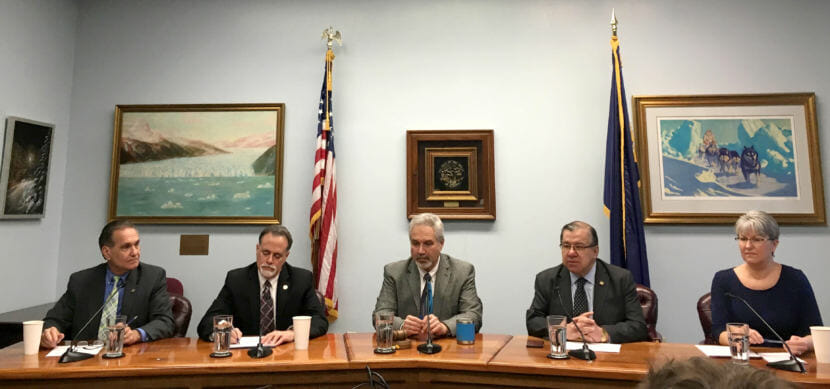
Alaska’s Legislature could finish the legislative session within a few days of its scheduled 90-day length.
But it’s not clear which bills lawmakers will pass in the remaining days, other than those related to the budget.
Senate President Pete Kelly said Senate leaders are optimistic about ending the session shortly after Sunday, the last day under the schedule set by state law.
Kelly, a Fairbanks Republican, said there’s been less disagreement between the two chambers this year.
“Last year, it was a full-on war between the House and the Senate,” Kelly said Monday.
By comparison, Kelly describes “high-level cooperation” this year on the budget.
Still, only six bills have passed both chambers. That number is much lower than the current record for the fewest bills passed in the state’s history – 32, set last year.
The Senate passed the sixth bill today – House Bill 168, a measure that repealed the Administrative Regulation Review Committee, which hasn’t done anything in 15 years.
Kelly said the slow pace is the result of differences between the Senate and House.
“It’s just going to be the natural outcome of having two bodies that are philosophically different,” Kelly said. “And we haven’t had that for a long time.”
Eagle River Republican Sen. Anna MacKinnon said there will be opportunities to pass several more bills before the session ends.
“There are many things we agree on and you’ll see those coming to fruition in the last seven days,” MacKinnon said.
They include minor bills to extend boards and commissions into the future.
A leader in the House agreed that much could happen quickly.
“It’s often late in the session when you pass the bills, especially on the second session,” Homer majority-caucus Republican Rep. Paul Seaton, the co-chairman of the House Finance Committee, said.
Bethel Sen. Lyman Hoffman, a Democrat, said that along with budget legislation, the most important remaining bill for the Legislature to consider is Senate Bill 26, which would close most of the long-term gap between state spending and revenue.
“How are we going to have the permanent fund be involved in addressing our fiscal crisis? That I think is probably the most important question,” Hoffman said.
The Senate Majority has stopped short of saying they wouldn’t end the session without a bill like Senate Bill 26, which would draw a percentage of the Alaska Permanent Fund’s market value to pay for state government.
But Hoffman – the longest-serving lawmaker — acknowledged that the two sides continue to differ.
“I wouldn’t be a happy camper” if the session ended without passing a plan, Hoffman said. “Having been here for many years, you have to live with what can get accomplished.”
The House has refused to pass a permanent fund plan without additional taxes that would fully close the budget gap.
The House majority has argued that passing a plan with taxes would be more responsible, and more fair to lower and middle income residents who are losing a significant share of their income through cuts to permanent fund dividends.
The House Finance Committee is discussing House Bill 411, which would raise taxes on oil and gas companies.
Senate leaders said it’s too late in the session to fully debate the bill.
Seaton said the House has been consistent in saying more revenue is essential. And he said the oil tax bill is identical to provisions in a bill the House passed last year.
“They’ve had this,” Seaton said of the tax legislation. “If they haven’t analyzed it, it means they weren’t interested in getting SB 26 done.”
One high-profile bill that could pass is Senate Bill 63, which would prohibit smoking in workplaces, including bars, and in outdoor spaces near workplaces.
The House Rules Committee is scheduled to hold a hearing on the bill Tuesday.
Committee Chairwoman Rep. Gabrielle LeDoux, an Anchorage Republican, had declined to hold a hearing so far this session.
Andrew Kitchenman is the state government and politics reporter for Alaska Public Media and KTOO in Juneau. Reach him at akitchenman@alaskapublic.org.




